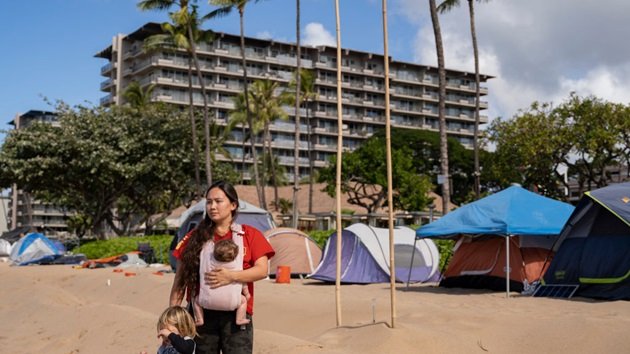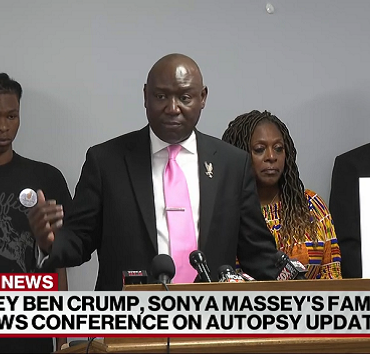-
 play_arrow
play_arrow
WMEX WMEX Boston
-
 play_arrow
play_arrow
Courage To Hope-Episode 82-Michael Courage To Hope-Episode 82-Michael
New Hawaii bill would ban foreigners from buying land on the Islands
todayFebruary 7, 2024

Mengshin Lin for The Washington Post via Getty Images
(HONOLULU) — A new bill in Hawaii aims to ban foreigners from purchasing land in the Aloha State.
State Sen. Brenton Awa, who introduced the bill, says it could address concerns about the ongoing housing crisis in the state.
“During the pandemic, right before I got into office here, we saw the home prices jump up $400,000 within a year, and that was because people outside were coming in,” Awa told local news outlet KHON-TV. “When they’re coming in with cash and our salaries over here are less than those of the people who are ready to retire, we can’t compete.”
The legislation reads: “At the time of purchase, a buyer of real property or an interest in real property shall provide an affidavit signed under penalty of perjury attesting that the buyer is not a foreign principal.” The legislation defines a “foreign principal” in part as “any person who is domiciled in a foreign country and is not a citizen or lawful permanent resident of the United States.”
In this Feb. 19, 2010 file photo, a homeless encampment is seen on the west side of Oahu, Hawaii.
Andre Seale/VW PICS/Universal Images Group via Getty Images, FILE
Residents have long complained about the impact of tourism and luxury home and resort development on housing accessibility, as well as the lack of affordable housing and rentals for residents. Hawaii residents have some of the highest housing costs in the nation — 2.5 times higher than the national average — according to the University of Hawaii Economic Research Organization.
The Maui wildfires burned thousands of structures in August 2023, including many affordable housing units, exacerbating the housing crisis.
State Attorney General Anne Lopez expressed concern about the bill’s “constitutionality and legality.”
She said the bill has potential, as written, to “subject the State to litigation and to cause the State to incur substantial monetary liability,” as well as its potential to violate the 14th Amendment, Fifth Amendment and Fair Housing Act.
A bill with similar language was passed by the Florida Legislature and signed by Gov. Ron DeSantis, but it has been partially blocked amid a legal challenge against the state. That bill specifically restricts Chinese buyers who are not citizens or lawful permanent residents from purchasing land in the state.
After signing the bill into law, DeSantis stated the law is intended “to counteract the malign influence of the Chinese Communist Party in the state of Florida.”
Federal appeals judge Nancy Abudu, in her decision, called the law “a blanket ban against Chinese noncitizens from purchasing land within the state” and said it “blatantly violates the 14th Amendment’s protection against discrimination” in her decision.
Awa’s bill in Hawaii is one of several proposed solutions to the housing issue as state officials scramble to implement housing policy amid outrage and calls for action from residents.
In January, Gov. Josh Green signed an emergency proclamation to work with federal and county agencies on measures to speed construction of tiny village communities that could offer shelter to unhoused residents.
“As long as we are in a housing crisis, we will treat it like an emergency,” said Green. “This emergency proclamation streamlines the construction process for housing, removing unnecessary red tape, and enables our community partners to tackle homelessness and the housing shortage head-on.”
Green has also implemented emergency declarations to restrict price gouging on necessities, including rent, food and water, as Lopez investigated dozens of reports of rent hikes and evictions following the tragedy.
Meanwhile, Maui County Mayor Richard Bissen proposed amending the County Code to exempt short-term vacation rentals, timeshares, and non-owner-occupied housing from paying real property taxes while they rent to Maui residents who have been displaced by the Aug. 8 tragedy.
Across Hawaii, homes have been converted to short-term rentals, taking up large swaths of potential long-term rental units.
Owners of properties assessed at over $1 million who choose not to rent their property to displaced victims would see an increase in their property taxes, according to Bissen.
“I believe that a shared sacrifice is necessary at this time,” Bissen said in a statement. “Owners who help our disaster-impacted families by making their units available will receive a tax waiver. While those who choose not to can help by contributing more in taxes to make up for the loss of tax revenue.”
Copyright © 2024, ABC Audio. All rights reserved.
Similar posts
CONTACTS
- https://wmexboston.com
- 781-834-WMEX(9639)
- studio@wmexboston.com
- 130 Enterprise Dr, Marshfield, MA 02171
ABOUT
WMEX Boston can be heard at 1510 AM, and 101.1 FM. Playing the greatest hits from 50s, 60s, 70s, 80s, and more!
MENU
SPONSORS
Copyright 2024 WMEX Boston - Design by Pro Radio Solutions




